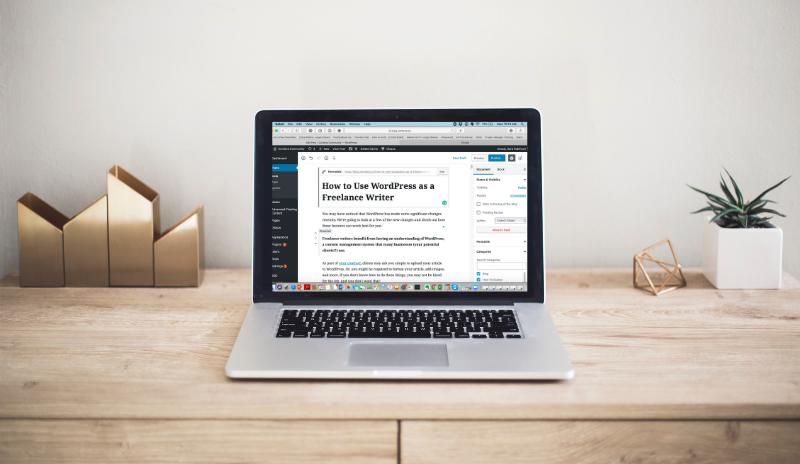Are you wondering if you should have a blog as a freelance writer?
I don’t mean a writer’s portfolio where you highlight your services and past work.
I’m talking about a traditional blog that you update regularly and includes posts on topics you want to write about- is worth it for freelance writers to have a blog?
Spoiler alert: I’m not going to give you a definitive answer to the question. No one can answer that for you.
But, we’re going to look at:
- Why you might want to have your own blog as a freelance writer
- Why you may not need (or want!) one, and
- If you decide to have a blog, some best practices
Why might a freelance writer want their own blog?
- You have control over your blog. You get to decide on the direction of the content, length, and how often you post, which isn’t often the case with your freelance writing clients.
- A blog helps to show off your work. Now, many companies will want samples that aren’t self-published, but your own blog can still be a way to show off the quality of your work. When I share samples, I’ll provide links to articles I’ve written for other sites, but I also include my own blog content if it’s extremely relevant.
- You’ll have the opportunity to learn about all of the other “stuff” that goes into blogging, like how to work with a CMS (content management system) like WordPress or SquareSpace. Blogging also requires promoting your posts so you begin to learn about social media and the basics of organic traffic growth and SEO.
- With the skills you learn from blogging you become more marketable, both for freelance writing jobs (like when they say “SEO knowledge desirable”) and for additional work. I was hired as a project manager for a company because of the skills I learned from having a blog.
- A blog can make you money: ads, sponsored posts, affiliate income- there are numerous options for monetizing your blog.
- You can show yourself to be an expert in a certain area. This can help you find more work, but also, people may find you. This year a publisher reached out to me to write a book based on content from my blog. Amazing, right?!
- Overall, though potentially time-consuming, blogs can be easy to start and are a way to put your writing out there into the world.
For me, starting a blog in 2016 was literally life-changing for my career, so yes, having a blog can be a great choice for freelance writers.
BUT- for every story like mine, there are just as many (if not more) stories of people who started blogs and it wasn’t a great choice for them.
The good news is, you don’t need to have a blog as a freelance writer. Like I said above, there are a lot of reasons it can be a good choice. But it’s not the only choice.
Why might a freelance writer not need or want a blog?
- I often refer to blogging as a rabbit hole. You can keep falling in deeper and deeper. There’s always more you can learn, more places to promote, more algorithms to (try to) understand. Having your own blog and trying to make it successful can be exhausting- it may not be necessary or worth it.
- It can feel disheartening to put so much time, energy, and sometimes money into something and not see it “pay off.” It wasn’t until early 2018 (almost 2 years after I started the blog) and getting a book deal that I felt like it was the blog (as opposed to what I’d learned from blogging) that made something happen.
- What you want to write about on your blog may not relate to the niche(s) you write in as a freelance writer. If that’s the case, then the blog may be fun, but it may not advance your career goals.
- Blogs can make money, but you may need high traffic levels along with strong engagement on the blog and social channels to make money. Additionally, many bloggers create products for passive income, but this creates more work that you may not have time for or be interested in.
- If you don’t have a lot of time, you have to prioritize. A blog may not be at the top of the list of things you have time to do, making it hard to start or maintain a blog. That’s okay.
- A blog isn’t the only way to have an online presence: An online portfolio or webpage makes it so that people can find you, while showing off content you’ve written elsewhere.
See? No concrete answer about if you should have a blog or not.
But- if you do decide to start a blog, then do it in a way that represents you well.
A few best practices for freelance writer’s blogs (because like I said, it’s a rabbit hole, so I could share tips for days):
- Consider what you want your blog to be about. A “lifestyle” blog that’s about your life is not likely to be super compelling for others, and may share too much about yourself to prospective employers. However, you could write about your life as a freelancer, or digital nomad, which may help you to create content to share with potential clients.
- Set your blog up in a way you can maintain it yourself. You probably don’t want to outsource every time you need to update something.
- Remember that you don’t need to spend a lot of money at the start: hosting and domain name, and possibly a paid theme. You can even do a free site, but be careful to read all terms and conditions and make sure those work for you and your goals. I’ve also read horror stories of blogs being shut down on free sites and there’s nothing the “owner” can do (because according to TOS, they weren’t really the owner of the content).
- Consider setting your homepage up as a landing page, which talks about what people will find on your blog and directs them to specific content, rather than a page that shows current posts with the date published. The latter makes it more obvious when you haven’t had time to keep your blog current.
- Limit your social media efforts: Don’t tackle all platforms. Figure out where your ideal readers are spending their time online and promote content there.
- Be sure that you pay for the images you use, or that they are from royalty-free stock photo sites so that you don’t find yourself on the hook for copyright infringement. We love Unsplash.
- Keep in mind that SEO is important and is a long-game effort. Depending on your content, Pinterest is a traffic driver for many people (it’s a visual search engine, not a social media platform). You may want to learn a bit about one or both.
- There is a free and paid version of almost everything. Try the free version and ask around to find out if the paid version is worth it.
- Monitor your social media use. If you focus on “being a blogger” and join groups (on Facebook, especially), you can spend a lot of time on social media in ways that feel productive, but really are just time sucks.
- Do your homework. If you have been writing content for blogs, you may think “cool, I can do this,” but there is SO MUCH that can go into being a blogger, or having a blog, so research it and do it well because prospective employers will find your blog and you want it to represent you as a writer.
TL;DR: We can’t tell you if having a blog as a freelance writer is a good choice.
What’s probably more important is having an online presence which helps to show people your work and allows you to be found.
It’s also helpful to become familiar with the skills that blogging would give you, like understanding SEO, social media, and CMSs. You don’t have to start a blog to gain that knowledge and experience, but it’s a great way to learn by doing.
If you do choose to start a blog (or are shifting from blogging to freelance writing), consider the tips mentioned above to help you be both a blogger and a freelance writer.










